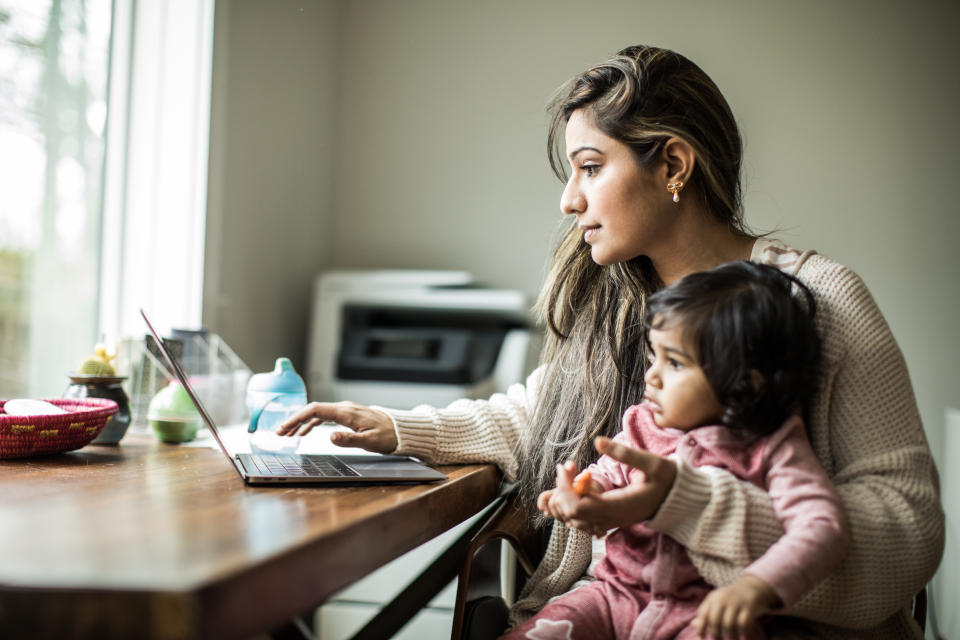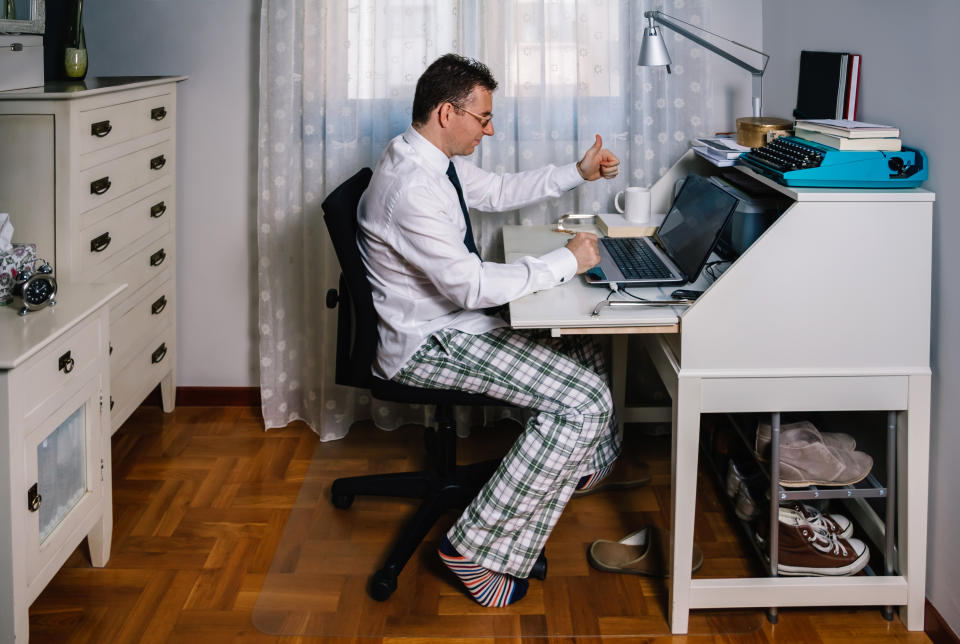Money, Honestly podcast: Is work-from-home the future? Maybe not.
More than half of the U.S. workforce was working from home in April, a dramatic increase from just 13% before the start of the pandemic, according to two rounds of surveys by Upwork. Hiring managers and employers have found the transition to remote work to be better than expected and say they are more open to such arrangements in the future.
But the case for permanent work-from-home may not be strong enough.
The first major issue is that about 2 in 5 jobs in the U.S. can’t be done entirely remotely, according to a paper by the National Bureau of Economic Research. But there are many other reasons why work-from-home might not be the future that Cashay.com Editor Janna Heron discusses with jobs reporter Denitsa Tsekova in the latest episode of the Money, Honestly podcast.
The podcast episode is based on reporting Denitsa did for the Yahoo Money article: “How the coronavirus pandemic will — and won't — transform work-from-home.”
Janna: Hi, this is Money, Honestly. I'm Janna Heron. And today I have Denitsa Tsekova, one of the reporters for my team at Yahoo Money and Cashay, joining us. We'll be talking about the future of working from home.
First off, I could say you're working from home, I'm working from home, we're doing this. We've been doing it, what, for three, more than three months now? So we're probably like a lot of the rest of the country. Can you tell us a little bit about how many people are actually working from home during this pandemic?
Denitsa: Yeah, for sure. First, thanks for having me. And yes, remote work has been increasing dramatically. Some of the data we have is that around 13% of the U.S. workforce was working remotely before the pandemic started. And now it's more than half of the workforce. So 56%. That's not now, sorry, but in April. But still a really big part of the workforce is working from home. It's something unprecedented, something that hasn't happened before. But this is also the data before most of the offices started reopening.
And with that really big growth in remote work, we've heard a lot about “remote work is the future”, “work is forever changed.” There will be no more of these kinds of big commercial offices we see in places like New York City. And these are really big statements that it's too early to say, but you know, it may be the case.
And even now when some states are reopening, we still see lots of companies having very generous policies in terms of remote work. Even when offices are reopening, employers are very careful and give a lot of flexibility to their employees about returning to work. We see some big tech giants like Twitter, Facebook, Shopify, even offering permanent remote work options, which we can definitely attribute to the pandemic.

There’s also Facebook, for example, aggressively opening up remote hiring. And Mark Zuckerberg said that in the next five to 10 years, 50% of Facebook's workforce is going to work remotely. So there have been a lot of people making the case that things are changing a lot.
Janna: And this could be the future, but there are a lot of jobs out there that you can't really do remotely. I mean, I know that like teachers, for example, have been doing remote learning as a last resort, but obviously it would be much easier for them to be in the classroom. How much of the workforce actually really can't work remotely?
Denitsa: Well, in the U.S. the most recent estimates we have from the national Bureau of Economic Research is 37%, which is a pretty big number of people that cannot fully work remotely. And that number is even bigger in lower-income economies than the U.S. so, you know, maybe in the U.S. they'll be a bigger transition to remote work, than in countries with less developed economies.
Janna: So based on your reporting, you've talked to a lot of different experts, and a lot of them are saying, maybe work-from-home is not going to be a permanent solution, even though right now, it seems very permanent for some people in companies. Like you said, some are offering work-from-home until the end of the year, there are even some saying, well, we might be able to do it permanently. But as we move forward, do you see that we're going to return more to what we used to know?
Denitsa: I think one important thing about the work-from-home transition is first, a lot of people are finding it very successful, but what happened this time, it was a very quick transition. And it was caused by obviously a big public health crisis followed by an economic crisis. And the effects that are in place now, we're not sure that they're going to last, once things start to change.
For example, a big pro of working from home is people say that workers are much more productive. One in three hiring managers found that the productivity has increased just from the work-from-home move that was made during the pandemic.

But the experts I talked to specifically, Jeff Kolko from Indeed, he said that this is probably not going to remain because when a company is in a survival mode, like many companies were during the public health crisis and they were freezing hiring, and weren't really in that kind of growth period, they weren't hiring new people. So in that kind of atmosphere, it's easier to do remote work because there aren't that many new people. The people that already work there have been there for awhile. So, it's kind of easier to communicate.
You don't necessarily have to train new people, get new people into the company. And sometimes this has brought a more productive workforce, but once this changes and the economy recovers, and the companies want to grow new talent, this will change because it would be harder, especially for people who are just entering [the company].
Janna: Right. I imagine like training for a new job, that would be a lot harder, getting to know your colleagues really well would be harder, so you'd be at a disadvantage. And I like the point of what you said about being in survival mode. I wonder that productivity that increased during the pandemic, if also employees felt like I have to prove that I'm still productive in case they start laying off, or there was a lot of uncertainty. So maybe you had like that fear factor on the employee part. So that's really, really interesting.
What about things like, you know, are employees really set up to work-from-home permanently? How, like that seems like we had to do it, but is that another challenge?
Denitsa: Yeah, I think again, coming from your point about people being more fearful, of course they were, it was kind of the mindset that it's something short term. A lot of people were afraid of being laid off, seeing the unemployment rate in the U.S. and how many companies are cutting their workforce. But these also came from the very quick transition from work home.
For many people, I've heard stories of it happening from one day to another. So while you were working in your office on Wednesday; Thursday, you were suddenly moved to entirely different environment in your new home office. And for many people, home office brings a lot of new challenges like while working in our office, we have a very similar environment. I'm sitting on the similar desk as yours and we kind of have the same level of noise, interactions or people distracting us

In our homes, it's very different because if someone has the possibility to get their own home office isolated from maybe their spouse, their children, that would likely lead to much higher productivity because you can have your own space where you can concentrate.
While people who maybe live in cities like New York, where housing is expensive and space is a problem - not having the chance to properly isolate, having people distract you throughout the whole time may lead to more unproductive work. And this creates an unequal work experience for people that didn't really exist before with our normal commercial office. And yeah, just for some, the distractions at home may be worse.
Janna: Right. And would there be a challenge going forward if you decide I'm going to be working from home, but your other colleagues aren't so they get more face time with the boss or with the clients. Does that also become a problem when it comes to this future from work-from-home?
Denitsa: Yeah, I think just for now is a very unprecedented time. So many people are working from home and, everyone that could work from home is not working from home. So we're in the situation where the majority of your colleagues are working from home, the majority of your clients are working from home. So the whole idea of the in-person meeting is obviously not there just for the public health threat, but it just much easier to get everyone together in a Zoom meeting.
But after people start returning to the office, we'll slowly get back to those in-person meetings. And those people who may remain working remotely for a longer time, they may start missing out from all these informal interactions we have in the office, all these conversations we only have in-person. And you might be soon the only person in the room who's joining a meeting remotely. And that may be a disadvantage if all your colleagues are in the room and having the same meeting in-person.
Janna: And by disadvantaged do you mean just being like for promotions or things like getting projects just because your face time in-person is so important?
Denitsa: For sure. Yeah. For promotions, for connecting. I think one of the biggest issues, the experts I talked to said that especially for young people or people who are early in their careers, the problem is they don't know people at the company and this kind of remote working environment is making it harder to network. And this makes it harder for promotions, maybe getting additional projects and all that.

Some of the experiments we have seen with remote work, there is a really big experiment with a Chinese travel agency and people working from home for nine months while some of their colleagues remain in the office. There are many positive things out of it in terms of productivity and job satisfaction but when it comes to promotion rate based on performance, it actually fell. So maybe continuing to work remotely while your colleagues remain in the office, uh, may be bad in terms of your career growth.
Janna: And what about from the employer side? Would they prefer work-from-home or would they prefer office or both?
I mean, there's like the cost of a commercial office space, which maybe could come off their books or they could get a smaller space. But what are the reasons employers may prefer in-person versus work for home or vice versa?
Denitsa: Yeah. Like just before the pandemic, work-from-home was considered as a perk for employees. And generally I think it's considered to be a good thing for the employees rather than employers, because employers often find that when people work remotely, they're kind of harder to supervise and monitor. So obviously that may complicate the workflow and the process on the employer side.
Now with the unemployment rates being 13.3%, one of the highest we have their own records, and since probably the Great Depression. companies will not be so keen on offering perks because the job is not as tight as it was. So there is really not that much need to do so much effort to attract new talent. Maybe for big tech companies, but for the rest of the companies, you don't have to put that much effort to get high-quality employees.
Janna: Sure there's a lot of people looking for jobs and not a lot of jobs looking for them. So one of the perks that you're talking or you're talking how employees like it more than employers, right?
And from my personal experience, there's, you know, you don't have to commute. So you kind of gain back that time, which you may even put towards working more. It's easier to keep my house clean. It's easier to make dinner. All those things get a little bit easier. So, and as a mom, too, I love the idea of having more flexibility from work-from-home. Did any of the experts you talk to talk about how maybe at least work-from-home might be, in the future, an option for more people? Because some businesses were less likely to offer that even on like a one-off basis or temporarily.

Denitsa: I think everyone I spoke to said that remote work will grow, so sure. It's not sure that it will be a permanent thing like for Twitter and Facebook which probably won't be as common, but I've heard a lot of talk of people saying that may be an option for one or two days will be much more common.
Some of the data we have from Upwork is saying that much more hiring managers are open to it. So while we may not see the full shift to remote work and this being the future, we may see much more flexibility and we can absolutely attribute that to the coronavirus pandemic in the future, especially for people, as you said, those who are parents and have much more responsibility than maybe those who enter the workforce.
Janna: Yes. And I wonder if it would become less of a stigma going forward too since everyone's gotten a taste of it or we know how to do it a little bit better than before, like we all know how to work the Zoom meeting.
Denitsa: Yeah, for sure. I think an interesting thing I read from Upwork is people find it much better than they expected — the transition to remote work. And it happened so quickly. And still obviously there are a lot of technical issues. We've all had problems with Zoom Meeting microphones on mute, and all that, but it's, you know, it's better than we expected. And I think employers, for sure, are seeing that, that it's not that hard to move your work remotely, even if it's for just a few days a week.
Janna: So yeah. So that's good news that we might have more flexibility with work-from-home going forward. What other kind of benefits do you think employees have when it comes to work-from-home?
Denitsa: I've been a bit negative about working from home being the future, but I think we shouldn't forget to mention how many good things work-from-home is bringing to their employees.The three main things are employees being more productive, which as we say with time, maybe it'll go down, but still for many, it can be a more productive activity. A really important thing is it's often much better for your mental health. And there are many studies supporting that. And the other thing is lack of commute, which is something all of us really appreciate.
And going back to that study of the Chinese travel agents where people were working remotely for nine months, they found that performance increased 13%, which was partially driven because people were working more — 9% of this was driven because of that. But 4% were because people actually did more work because they were less distracted and the working environment was more convenient and it was quieter than their office. So we should keep that in mind. And the other thing is workers also reported improved satisfaction and their attrition rates decreased.
So we don't know if work-from-home will be the future but for sure there'll be an increase. But we have to even maybe for ourselves kind of reflect all the positives that work-from-home and remote work gave us and maybe consider if this is the thing for us in the future.
Janna: Right. And maybe it's for you, maybe it’s not for you right now, but maybe if it's an option 10 years later when you need it, that would work.
This is all very interesting. Thank you, Denitsa, for joining us today on Money, Honestly, and thanks everyone for listening. Head over to Apple Podcasts and leave us a five-star rating and review. We'll see you next week!
Denitsa is a reporter for Yahoo Finance and Cashay. Follow her on Twitter @denitsa_tsekova.
Read more information and tips in our Career section






